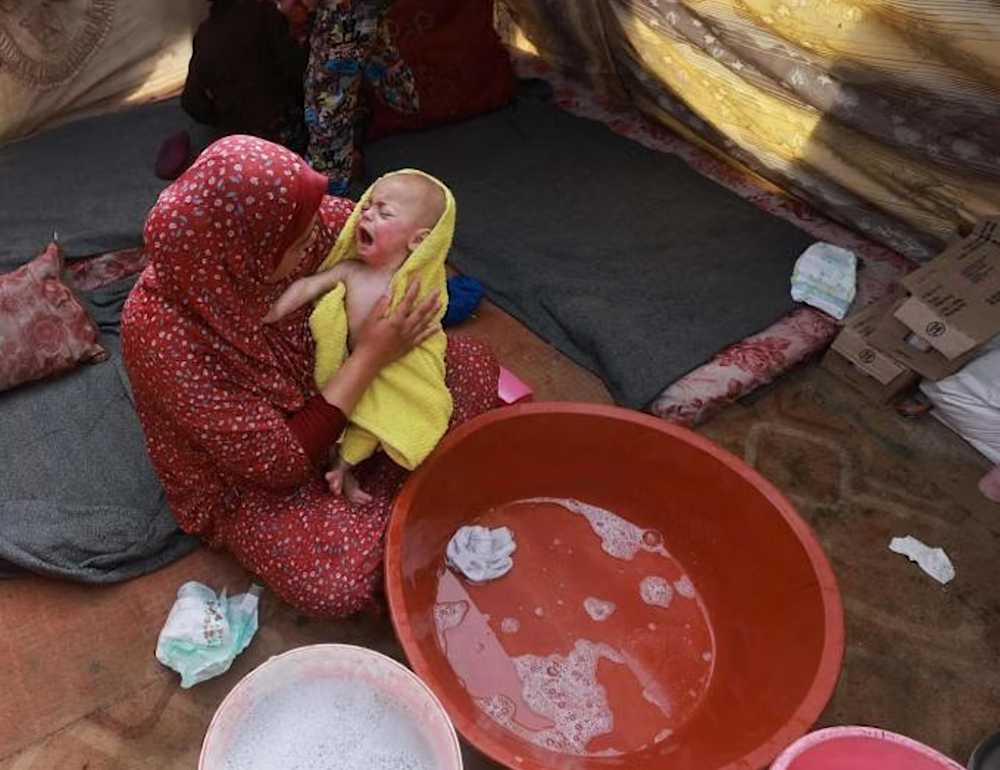1 baby every 10 minutes born into war-torn 'hell' of Gaza
Another crime added to the long list of Israeli atrocities; miscarriages in Gaza increased by 300% since the aggression on Gaza started.
-

A woman dries a baby after bathing the child, at a camp for displaced Palestinians in Rafah, in the southern Gaza Strip. (AFP)
Miscarriages have increased dramatically in Gaza, according to healthcare experts, with factors such as hunger and a lack of access to health care and cleanliness caused by "Israel's" brutal siege, resulting in serious health crises throughout the territory, Truthout reported.
A CARE International Spokesperson told Jezebel in a piece published on Wednesday that miscarriages in Gaza had increased by 300% since "Israel's" murderous onslaught began.
This has been made worse as the Israeli occupation forces (IOF) have decimated all forms of basic infrastructure in Gaza, severely limiting or destroying systems for water, food, energy, communications, health care, and other essential survival necessities.
The continued genocide has produced a slew of situations that might result in miscarriages and prenatal deformities. According to studies, the chance of miscarriage rises when exposed to armed conflict, a lack of access to reproductive care, polluted water, infectious disease exposure, malnutrition, fast weight loss, famine, and other factors.
According to reproductive rights organizations, the reproductive care system in Gaza was almost destroyed during the first few weeks of the onslaught, and with only a few hospitals still operating, many are running at ten times their capacity for prenatal care, leaving pregnant women with few alternatives for places to give birth and almost nowhere to seek prenatal care.
Ammal Awadallah, executive director of the Palestinian Family Planning and Protection Association, told Jezebel that every pregnant woman in Gaza is in danger and may give birth in unsafe settings like cars, tents, and shelters.
Furthermore, a lack of antiseptics and other hygienic measures raises the risk of infection for pregnant women.
Meanwhile, CARE advisor Nour Beydoun told Jezebel that babies are at risk from infections and difficulties, with many dying owing to a shortage of staff, facilities, energy, hygiene, and other concerns exacerbated by the blockade.
Doctors Without Borders recently shared the tale of a newborn who died after his mother delivered him in a restroom in the camp where she was taking shelter. The mother could not be admitted to the hospital due to it being at full capacity.
Menstrual products are also extremely scarce, forcing women to resort to reusable cloths and further placing them in danger of urinary tract and other reproductive illnesses. Due to the unimaginable amount of stress, some women are menstruating more than once a month.
20,000 babies born into war
Upon concluding his visit to Gaza, UNICEF Deputy Executive Director Ted Chaiban said that since his last visit to the besieged Strip two months ago, "the situation has gone from catastrophic to near collapse."
UNICEF communication specialist Tess Ingram expressed during a press briefing in Geneva that close to 20,000 babies have been born in war-torn Gaza since the start of the aggression, nearly a baby every 10 minutes.
She recalled her time in Gaza's Emirati hospital in Rafah and the "heartbreaking" cases she encountered.
She spoke of Iman, a woman who has suffered from a severe infection after a cesarean birth, and Mashael, another woman who has not felt her baby move in her belly for a month and is still awaiting medical care.
Ingram also recalled the nurse named Webda who had to perform 6 emergency cesareans on dead women in the last 8 weeks of war.
“The situation of pregnant women and newborns in the Gaza Strip is beyond belief, and it demands intensified and immediate actions," Ingram expressed.
She reported that the Emirati hospital is being forced to discharge women 3 hours after a cesarean surgery due to overcrowding.
“These conditions put mothers at risk from miscarriages, stillbirths, preterm labor, maternal mortality and emotional trauma. The trauma of war also directly impacts newborns, resulting in higher rates of undernutrition, developmental issues, and other health complications."
The communications specialist also touched on the "inhumane conditions" that pregnant women are living in like "makeshift shelters, poor nutrition, and unsafe water," which is exacerbating the risk of severe malnutrition for nearly 135,000 children.
She also pointed out that despite all the insufferable conditions, UNICEF is yet to access the northern part of Gaza, where she called the situation "incredulously worse".
Ingram urged for a humanitarian ceasefire for the sake of mothers and newborns and expressed that in Gaza, every child born is "another child delivered into hell," rather than being born into a celebration.

 4 Min Read
4 Min Read








